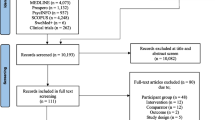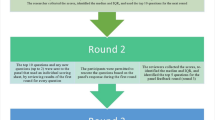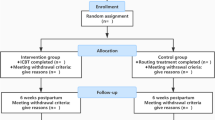Abstract
Health-related quality of life (HRQoL) has emerged as a major public health concern in perinatal care. The purpose of this study was to examine the effect of telephone-based cognitive behavioral therapy (T-CBT) on HRQoL among Chinese mothers at risk of postnatal depression at 6 weeks and 6 months postpartum. A multi-center randomized controlled trial was conducted at the postnatal units of three regional hospitals. Three hundred and ninety-seven women at risk of postnatal depression were recruited and were randomly assigned to the T-CBT (n = 197) or usual care (n = 200). Assessment was conducted at baseline, 6 weeks and 6 months postpartum for HRQoL. Women in the T-CBT experienced greater improvement in the physical component of HRQoL from baseline to 6 weeks and 6 months postpartum than the usual care group. At 6 months postpartum, the T-CBT group also experienced better HRQoL in the mental component of HRQoL than the usual care group. The T-CBT appears to be feasible and effective in improving HRQoL in women at risk of postnatal depression in the primary care practice.

Similar content being viewed by others
References
Bahrami N, Karimian Z, Bahrami S, Bolbolhaghighi N (2014) Comparing the postpartum quality of life between six to eight weeks and twelve to fourteen weeks after delivery in Iran. Iran Red Crescent Med J 16:e16985
Cheng CY, Li Q (2008) Integrative review of research on general health status and prevalence of common physical health conditions of women after childbirth. Womens Health Issues 18:267–280
Cuijpers P, Weitz E, Karyotaki E, Garber J, Andersson G (2015) The effects of psychological treatment of maternal depression on children and parental functioning: a meta-analysis. Eur Child Adolesc Psychiatry 24:237–245
Dennis C-L, Creedy DK (2013) Psychosocial and psychological interventions for preventing postpartum depression. Cochrane Collaboration 2:CD001134
Hunter LP, Rychnovsky JD, Yount SM (2009) A selective review of maternal sleep characteristics in the postpartum period. J Obstet Gynecol Neonatal Nurs 38:60–68
Lam CL, Tse EYY, Gandek B (2005) Is the standard SF-12 health survey valid and equivalent for a Chinese population. Qual Life Res 14:239–547
Lee D, Yip SK, Chiu HF, Leung TY, Chan KP, Chau IO, Leung HC, Chung T (1998) Detecting postnatal depression in Chinese women: validation of the Chinese version of the Edinburgh Postnatal Depression Scale. Br J Psychiatry 172:433–437
Liu MC, Kuo SH, Lin CP, Yang YM, Chou FH, Yang YH (2014) Effects of professional support on nausea, vomiting, and quality of life during early pregnancy. Biol Res Nurs 16:378–386
Logsdon MC, Foltz MP, Stein B, Usui W, Josephson A (2010) Adapting and testing telephone-based depression care management intervention for adolescent mothers. Arch Womens Ment Health 13:307–317
Morrell CJ, Warner R, Slade P, Dixon S, Walters G, Paley G, Brugha T (2009) Psychological interventions for postnatal depression: cluster randomized trial and economic evaluation. Health Technol Assess 14:30
Ngai FW, Chan SWC (2012) Stress, maternal role competence, and satisfaction among Chinese women in the perinatal period. Res Nurs Health 35:30–39
Ngai FW, Ngu SF (2013a) Family sense of coherence and quality of life. Qual Life Res 22:2031–2039
Ngai FW, Ngu SF (2013b) Quality of life during the transition to parenthood in Hong Kong: a longitudinal study. J Psychosom Obstet Gynecol 34(4):157–162
Ngai FW, Chan SWC, Ip WY (2009) The effects of a childbirth psychoeducation program on learned resourcefulness, maternal role competence and perinatal depression: a quasi-experiment. Int J Nurs Stud 46:1298–1306
Ngai FW, Wong PWC, Leung KY, Chau PH, Chung KF (2015) The effect of telephone-based cognitive-behavioral therapy on postnatal depression: a randomized controlled trial. Psychother Psychosom 84:294–303
O'Hara MW, Wisner KL (2014) Perinatal mental illness: definition, description and aetiology. Best Pract Res Clin Obstet Gynaecol 28:3–12
Sadat Z, Abedzadeh-Kalahroudi M, Kafaei Atrian M, Karimian Z, Sooki Z (2014) The impact of postpartum depression on quality of life in women after child’s birth. Iran Red Crescent Med J 16:e14995. doi:10.5812/ircmj.14995
Shaw E, Levitt C, Wong S, Kaczorowski J (2006) Systematic review of the literature on postpartum care: effectiveness of postpartum support to improve maternal parenting, mental health, quality of life, and physical health. Birth 33:210–220
Teissèdre F, Chabrol H (2004) Detecting women at risk for postnatal depression using the Edinburgh Postnatal Depression Scale at 2 to 3 days postpartum. Can J Psychiatr 49:51–54
Testa MA, Simonson DC (1996) Assessment of quality-of-life outcomes. New England J Med 334:835–840
Ugarriza DN, Schmidt L (2006) Telecare for women with postpartum depression. J Psychosoc Nurs Ment Health Serv 44:37–45
Wang P, Liou SR, Cheng CY (2013) Prediction of maternal quality of life on preterm birth and low birthweight: a longitudinal study. BMC Pregnancy Childbirth 13:124
Ware JE, Snow KK, Kosinski M (1993) SF-36 health survey manual and interpretation guide. The Health Institute, New England Medical Centre, Boston
Wong FKD, Poon A (2010) Cognitive behavioural group treatment for Chinese parents with children with developmental disabilities in Melbourne, Australia: an efficacy study. Aust N Z J Psychiatry 44:742–749
Wright JH, Basco MR, Thase MEE (2006) Learning cognitive-behavior therapy: an illustrated guide. American Psychiatric Publishing, Washington DC
Zubaran C, Foresti K (2011) Investigating quality of life and depressive symptoms in the postpartum period. Women Birth 24:10–16
Acknowledgements
We would like to thank Ms. Ada Wing Yee Ho for her help in trial treatment and our research team in data collection and management.
Author information
Authors and Affiliations
Corresponding author
Ethics declarations
Conflicts of interest
The authors declare that they have no conflicts of interest.
Funding
This study was supported by the Health and Medical Research Fund of the Hong Kong SAR Government.
Ethical approval
All procedures performed in this study involving human participants were in accordance with the ethical standards of the institutional research committee and with the 1964 Helsinki declaration and its later amendments or comparable ethical standards.
Additional information
Trial Registration: clinicaltrials.gov Identifier NCT01507649
Rights and permissions
About this article
Cite this article
Ngai, FW., Wong, P.WC., Chung, KF. et al. The effect of a telephone-based cognitive behavioral therapy on quality of life: a randomized controlled trial. Arch Womens Ment Health 20, 421–426 (2017). https://doi.org/10.1007/s00737-017-0722-0
Received:
Accepted:
Published:
Issue Date:
DOI: https://doi.org/10.1007/s00737-017-0722-0




